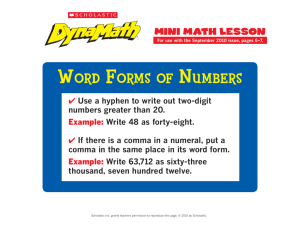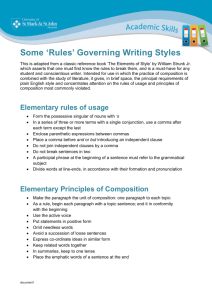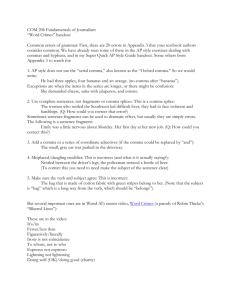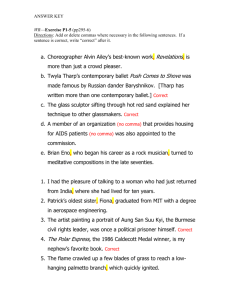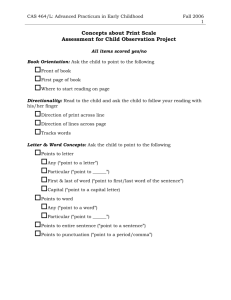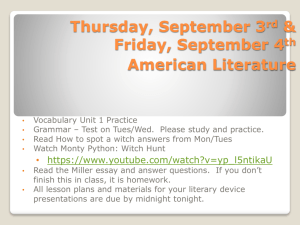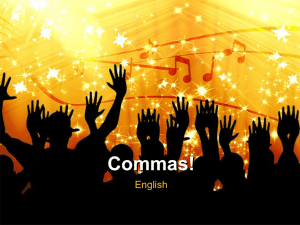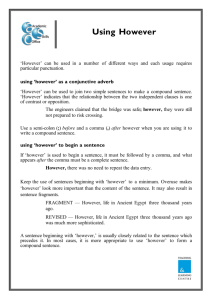Good Writing
advertisement
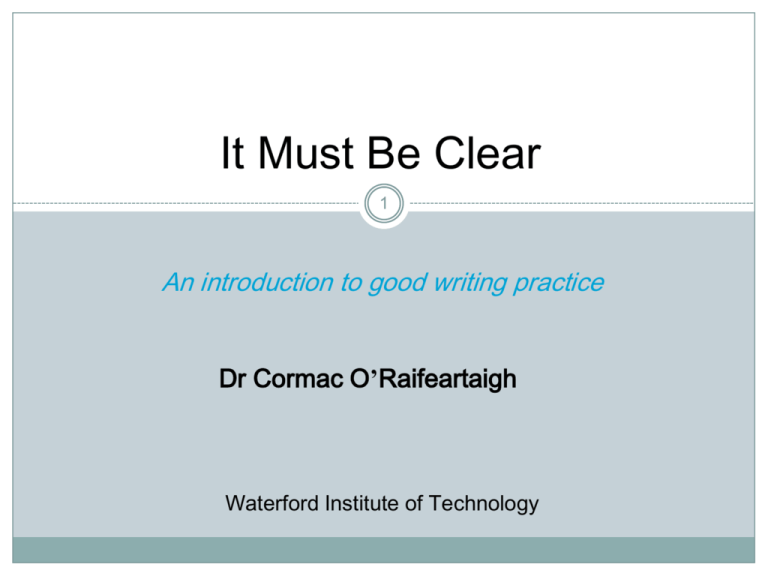
It Must Be Clear 1 An introduction to good writing practice Dr Cormac O’Raifeartaigh Waterford Institute of Technology Overview I What constitutes good writing? Clarity, precision and conciseness Easy examples Technical papers vs general articles II How do we achieve good writing? Planning Draft writing Re-writing Proof-reading Punctuation Sources Good Writing Guide University of Wales, Aberystwyth Mind The Stop (G.V. Carey) Pengiun Eats, Shoots & Leaves (Lynne Truss) Profile Books A Field Guide for Science Writers Oxford (Blum, Knudson and Henig) Sentence Clarity and Combining Purdue University Writing Lab What is good writing? 4 Good writing is clear: precise: concise: easy to understand says exactly what is meant to the point appropriate to audience and context Six rules (Orwell) • Never use a metaphor, simile or other figure of speech which you are used to seeing in print • Never use a long word where a short one will do • If it is possible to cut out a word, always cut it out • Never use the passive where you can use the active • Never use a foreign phrase, a scientific word or a jargon word if you can think of an everyday English equivalent • Break any of these rules sooner than say anything outright barbarous. George Orwell "Politics and the English Language", 1946 Example: inappropriate writing 6 “In view of the restrictions on the use of acetyl hydride derivatives as anti-bacterial agents imposed by recent secondary legislation, the attention of members of the estates maintenance staff is drawn to the need, subject to any overriding health and safety considerations, to avoid using proprietary anti-bacterial agents that do not display the relevant certification mark”. [from instructions issued to cleaners] See RM Writing that is unclear 7 Three types of unclarity the meaning can be guessed the meaning cannot be guessed the meaning can be misunderstood good writing cannot be misunderstood Example: writing that is unclear 8 When entering the data regarding the student’s registered modules, modules that are core to the scheme or schemes for which the student originally entered the institution should be entered before optional or elective modules, except in the case where such modules can be the subject of accredited prior learning, in which case the registration for them should be entered using the APL screen, unless it is known that the programme/module combination is specifically excluded by the programme specification. [from the user manual for a student record system] Example: writing that is unclear Leonora walked on her head a little higher than usual Don’t guess, use a timer or watch He shot himself as a child No dogs please The convict said the judge is mad The people in the queue who managed to get tickets were satisfied The driver managed to escape from the boat before it sank and swam to the riverbank “FAN’S FURY AT STADIUM INQUIRY” “Now I must go and get on my lover” Eats, shoots and leaves Example: writing that is imprecise 10 “Due to the installation of new doors, keys may be collected in the estates office” “Tickets may be purchased upstairs” “Re-fills will be brought to the tables in the mornings” “I, Graham Greene, grant permission to Norman Sherry, my authorised biographer, excluding any other, to quote from my copyright material..” “Am I looking at my dinner or the dogs?” Examples from science Four fundamental forces in nature exist: gravity, electromagnetism, the strong nuclear force and the weak nuclear force It is now thought that the four ‘fundamental’ forces originally comprised a single superforce; this force gradually split into four separate forces shortly after the Big Bang Because the speed of light is finite, we see distant galaxies as they were many millions of years ago Kepler discovered that the orbits of the planets are elliptical How is good writing achieved? 12 Reading Critical reading Distinguishing between good writing and poor Planning Early writing Re-writing (x 10) Proof-reading Type of Article 13 • • • • • • Scholarly writing (specific) Original research paper Research letter Funding proposal/report Talking about research area (general) Overview article for funding body Feature article for magazine (RM) Feature article for newspaper Type of Audience 14 • Researchers? Display knowledge of area Be accurate and to the point Present results clearly Offer interpretation • General audience? Don’t assume prior knowledge Use plain language Don’t be too specific Beware of over-simplification Planning: Stage One 15 • Am I clear on the precise topic? • Which journal/magazine? • What format of article? • Who is the reader? • What is the length of the article? • What are the points you wish to make? Avoid the computer at this stage Early writing: the first drafts Write, write, write Include all possible points you wish to make Ignore grammar, syntax, spelling Impose rough logical order on points Use multiple drafts in series Parallel drafts? Plan B Consider order of paragraphs Consider order of sentences Re-writing Do not re-write too early Re-read background material, early drafts New points to include? Discard minor points, discard Plan B Eventually…..time to rewrite…send in the grammar police Impose the laws of grammar Impose basic punctuation Improve sentence clarity Improve paragraph clarity Another 5-10 drafts: rd x 2 The final drafts: proof-reading Take time over re-writing But not too much… Show to others – internal, external Ask for feedback on structure, content, language Incorporate new ideas Re-write carefully Final proof-reading:BE VERY CAREFUL It Must Be Clear II:Punctuation 19 Keep it simple Avoid long sentences Use semi-colons and colons Use commas judiciuosly Use brackets, italics and other aids Avoid too much passive tense Exercise: sentence formation 20 When the proposals for establishing the Institute of Rubber Technology were under discussion, it was agreed that the Director would be accountable for the management of the Institute and its budget to the ViceChancellor of the University, and that a Steering Group, representing the interests of the University and the rubber industry in Britain and including one or more eminent figures from the world of rubber technology, should be formed to provide an independent source of advice to the Director and sponsors of the Institute about the Institute’s policies, research programmes and business plans, together with a Management Committee appointed by Senate to promote close links between the Institute, on the one hand, and the University and the National Rubber Authority on the other. Solution 21 When the proposals for forming the Institute of Rubber Technology were under discussion, it was agreed that the Director would be accountable to the ViceChancellor of the University for the management of the Institute and its budget. A Steering Group would be formed to provide an independent source of advice to the Director and the sponsors of the Institute about the Institute’s policies, research programmes and business plans. The Steering Group would represent the University and the British rubber industry and would include one or more eminent figures from the world of rubber technology. A Management Committee would be appointed by Senate to promote close links between the Institute, on the one hand, and the University and the National Rubber Authority on the other. Punctuation 22 The full-stop The semi-colon and the colon The comma The apostrophe Special guest The passive tense The semi-colon 23 semicolon = semi full-stop Def: if a sentence can be split into two independent sentences without adding, deleting, or changing any words, the correct punctuation mark is the semi-colon “The candidate did not make a very good impression; he looked as though he needed a good wash” “WIT has 5000 students; most drive to college” “Ireland is a small country; issues of scale arise” Note: the second phrase is related to the first The semi-colon vs the splice comma 24 “UCW has about 7,000 students; almost all of them are full time.” but not “UCW has about 7,000 students, almost all of them are full time.” Possible: “UCW has about 7,000 students, almost all of whom are full time.” The colon 25 Similar to semicolon but: Provides specific information relevant to the preceding clause Used in a list Used for effect Examples: colon “The chief exports of the country are: coal, copper, lead, wool, timber, and small boys” “All sorts of people turned up for the seminar: doctors, scientists, and even philosophers” “The following articles were found on his person: a wallet containing a three-euro note, an empty brandy flask, two pipes and a matchbox” “My circumstances are now different: I am married, with a home of my own” “You have two chances: fat and slim” The comma 27 Four main types of comma use The listing comma The conjunctive comma The sub-clause commas The speech commas Note: avoid the splice comma The listing comma 28 In a list of items, use a comma after each one except, possibly, the last “Non-linear data structures include trees, graphs and heaps.” “The PDP11 proved to be a fast, cheap, and reliable computer that everyone liked” “Trees, graphs, and heaps, are all instances of non-linear data structures.” Note: omission of final comma not fixed rule The conjunctive comma 29 “Trees, graphs, and heaps, and many others, are instances of non-linear data structures.” “The PDP11 proved to be a fast, cheap, and reliable computer , but noone liked it much” “The firms involved were Harrods, Lyons, Marks and Spencers, and Woolworths” “Hammersmith, Brentford and Chiswick, Fulham, and Wandsworth” ©University of Wales, Aberystwyth The sub-clause commas 30 “The best way to sort a list, unless you are sure that it is nearly ordered already, is to use Hoare’s algorithm.” Some scientists insist, despite all the evidence to the contrary, that cats have five legs “Aberystwyth, a small town on the Welsh coast, is the home of the National Library.” “Despite the best efforts of the Bush administration, a general consensus that man-made emissions are a significant driver of enhanced global warming has emerged” Don’t omit the twin ©University of Wales, Aberystwyth The speech comma 31 She asked, “Why?”, but he did not answer They shouted , “Out”, and out he went “Go ‘way”, the little girl cried in response to his lullaby Danger: the splice comma 32 Do not join two unrelated statements Today is Monday, my name is Jack I enjoyed the meal, we went to the cinema Do not join two related statements The waves were good, we went surfing WIT is a very good college, I have been here 3 years Apostrophes 33 Apostrophes have two distinct roles to indicate possession (shortens a sentence) to show where letters have been omitted (shortens a word) They should never be used to form a plural The possessive apostrophe 34 if A is singular and does not end in an s or a z write John’s book if A is singular and ends in an s or a z write Charles’s beer (with exceptions) if A is plural and ends in an s, then write A’ e.g. the students’ rooms If A is plural but does not end in s, write A’s X e.g. the Iceni’s chariots Example AC, RM Counterexamples “The judges decision is final” Two Weeks Notice (film) “BOB,S PETS” “DEAD SONS PHOTOS MAY BE RELEASED” “Am I looking at my dinner or the dogs?” “CD’s, DVD’s, Video’s, and Book’s” Apple’s, oranges’ and pears’ “Illiterate’s Entrance” Eats, Shoots & Leaves Tips for apostrophes 36 Write/read carefully Avoid apostrophes in complex expressions The King of Spain’s daughter the SSADM entity life histories’ diagrammatic format (the diagrammatic format of the SSADM entity life histories ) ‘An exploration of Community Mental Health Nurses’ views and practices in relation to The Metabolic Syndrome’ The omission apostrophe 37 Shows that one or more letters have been omitted we can’t go we mustn’t go we won’t go it’s all over Nothing to do with possession Its and it’s 38 A common error is to write it’s for its. It’s : Its: a contracted form of it is; the possessive form of it (exception) It’s raining The cat wagged its tail The baby ate its formula “It’s an ill wind that blows its own trumpet.” Tip: always use ‘it is’ The passive 39 A clause is passive if it has a structure such as “The man was bitten by the dog” “The web page is loaded by the browser” A clause is active if it has a structure such as “The dog bit the man” “The browser loads the web page” How not to use the passive. 40 Drinks are not allowed to be brought into this building Bringing drinks into this building is forbidden Work cannot be submitted after the semester is over You may not submit work after the semester Music cannot be performed while the red light is on Do not perform music if the light is on When to use the passive (1) 41 To avoid stating who carried out an action ( if the reader doesn’t need to know) The next module is then loaded from the disc A dozen samples were tested The prisoners were killed The bodies were disposed of When to use the passive (2) 42 To put the emphasis in the right place The World Wide Web was invented by an English physicist The internet was invented by the American military When to use the passive (3) 43 To make a good transition from one sentence to the next The TREE_SORT module invokes the COMPARE function. The user must instantiate this module (the references to the TREE_SORT module are far apart) The COMPARE function is invoked by the TREE_SORT module. The user must instantiate this module. Summary Clarity: make it easy to understand Precision: say what you mean Conciseness: don’t waste words Good writing is appropriate to context Good writing is easy to understand
